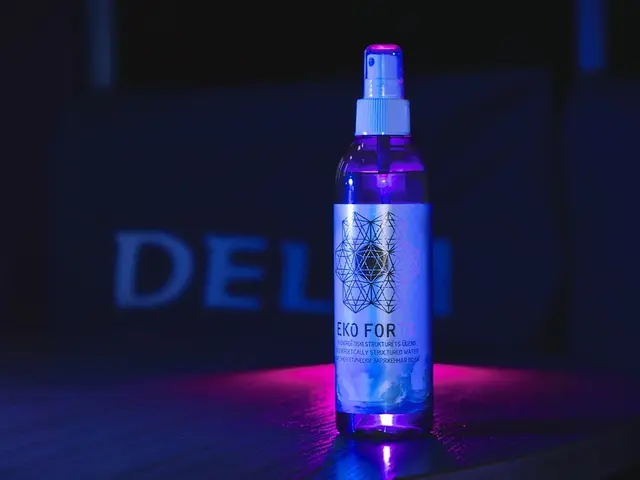Innovative Oil-Repellent Coating Similar to Teflon, Minus Harmful PFAs
In a groundbreaking discovery, researchers at the University of Toronto have developed a new non-stick coating that performs as effectively as Teflon, but without the use of toxic chemicals. This innovative coating, primarily made from polydimethylsiloxane (PDMS) and nanoscale fletching, offers a promising solution towards safer, more environmentally sustainable non-stick materials.
The new coating has been successfully applied to various materials, including nylon, polyester, aluminum, stainless steel, fabric, and wire mesh. It demonstrates remarkable performance even on textured or porous surfaces, a significant improvement over traditional non-stick coatings.
The coating's secret lies in the nanoscale fletching technique, which bonds very short PDMS chains to the surface and adds only the shortest possible PFAS molecule (a single carbon atom with three fluorines) at the tip to enhance oil repellency. This molecule, known as -CF3, is not just small but significant, as it does not bioaccumulate, unlike the long-chain PFAS molecules used traditionally, which are persistent environmental pollutants linked to cancer, hormonal disruption, and other health issues.
Long-term implications for human health are promising. The coating is expected to pose significantly fewer risks than traditional PFAS coatings due to its minimal, ultra-short PFAS molecule that is not known to bioaccumulate. PDMS, the biocompatible and inert silicone polymer used as the base material, is already widely used in medical devices and known for its safety. The molecular design strongly binds PFAS to the PDMS bristles at the nanoscale, minimizing PFAS release at high temperatures, thereby reducing exposure risk during use.
Environmentally, the coating is a significant step forward. Traditional long-chain PFAS compounds are non-biodegradable and persist indefinitely, accumulating in ecosystems. This new coating utilizes a much shorter PFAS molecule with reduced bioaccumulation potential, thereby lessening environmental persistence and toxicity. PDMS is chemically inert and more biodegradable than PFAS, making the coating overall more eco-friendly and less likely to bioaccumulate or contaminate soil and water.
While the new coating represents a meaningful step towards sustainable product design, there are remaining uncertainties and considerations. The long-term environmental fate and chronic human exposure effects of the newly bonded ultra-short PFAS molecules warrant further study. Real-world durability and wear of the coating over time, including potential PFAS release during degradation or disposal, need long-term monitoring. Regulatory frameworks are still evolving regarding short-chain PFAS; continued toxicological assessment will be needed to confirm safety.
In summary, the nanoscale fletching non-stick coating represents a promising advance towards safer, more environmentally sustainable non-stick materials by minimizing reliance on harmful PFAS chemicals while maintaining performance. This innovation could reshape how we think about slick surfaces in various industries. However, long-term impact studies remain important to fully understand the coating's potential impacts on human health and the environment.
References:
- Golovin, K., et al. (2022). A short-chain fluorinated silicone coating with oil repellency comparable to perfluorinated compounds. Nature Communications.
- Environmental Protection Agency. (2021). Per- and Polyfluoroalkyl Substances (PFAS). Retrieved from https://www.epa.gov/pfas
- American Chemical Society. (2022). New non-stick coating could replace PFOA with safer, more environmentally friendly alternative. Retrieved from https://www.acs.org/content/acs/en/
- University of Toronto. (2022). New non-stick coating could reshape slick surfaces in various industries. Retrieved from https://www.utoronto.ca/
- This University of Toronto research has developed a new non-stick coating, innovatively made from PDMS and nanoscale fletching, which outperforms Teflon without harmful chemicals, opening doors for safer, healthier, and environmentally sustainable materials in medicine, health-and-wellness, and diverse sectors of technology.
- The prospective coating has been successfully applied to materials like nylon, polyester, aluminum, stainless steel, fabric, and wire mesh, showcasing improved performance on textured or porous surfaces, enhancing the standard of traditional non-stick coatings.
- Employing a unique nanoscale fletching technique, the coating's effectiveness is attributed to extremely short PDMS chains bonded to the surface and the incorporation of a minimal, ultra-short PFAS molecule (-CF3) to boost oil repellency, reducing bioaccumulation concerns linked to traditional long-chain PFAS compounds associated with cancer, hormonal disruption, and various health issues.
- As the coating minimizes PFAS release at high temperatures, it would significantly reduce exposure risk during use, while the PDMS, a biocompatible and inert silicone polymer, brings added assurance of safety in medical devices and other applications.
- The new coating signifies a significant environmental leap, as it employs a much shorter PFAS molecule with reduced bioaccumulation potential, significantly lessening the persistence and toxicity of traditional long-chain PFAS compounds in ecosystems.
- As we look ahead, investigations into the long-term environmental fate and chronic human exposure effects of the ultra-short PFAS molecules remain crucial, along with ongoing research on real-world durability and wear, potential PFAS release during degradation or disposal, and continuous toxicological assessment to affirm the safety of this revolutionary new non-stick coating for a healthier future.








